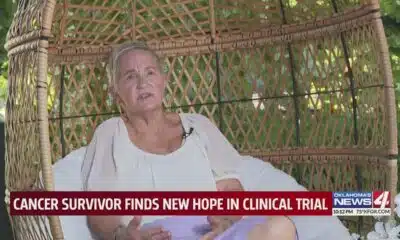News from the South - North Carolina News Feed
An important campaign where both candidates are well-qualified, admire each other, and won’t take a salary • Asheville Watchdog
Deep into the general-election ballot, far below the choices for president, for Congress, for the North Carolina cabinet, for the General Assembly, for a plethora of judges, for county commission and the Register of Deeds, eventually you’ll come to an office whose purpose may be a puzzle:
Buncombe Soil and Water Conservation District Supervisor.
Don’t skip the line. This government service may be the most overlooked and under-appreciated choice you’ll make. And in the devastating wake of Helene, the winner may exert extraordinary influence toward Buncombe County’s recovery.
The Soil and Water Conservation Service can be the source of millions of federal and state dollars. And the practices it implements may be critical in helping the region avoid or withstand such destruction in the future.
The good news is that you don’t need to feel pressure in marking the ballot. The campaign (if you can call it that) is between two well-qualified candidates who know and speak admiringly about each other.
Imagine that: a choice between good (Stuart Rohrbaugh) and good (Blair Thompson).

“His credentials are pretty amazing,” Rohrbaugh said of Thompson, the manager of Warren Wilson College’s extensive farming operations in Swannanoa. “You talk about somebody who’s well qualified…”
And Thompson said of Rohrbaugh, a retired land and development planner for many local governments in the region: “All that I’ve heard about my opponent are good things. I don’t view this as running against him. I just tell people, ‘This is what I can contribute and this is who I am.’”
“I’m hopeful that whoever ends up in this office is going to do their best just to be a resource for the community,” Thompson said.
As an added plus to taxpayers, they’ll work for nothing. It’s pure public service.
“Keep politics out of it”
Most counties in North Carolina have a Soil & Water Conservation District governed by a five-member board of supervisors, three of whom are elected and two appointed by the board. The position of Soil and Water Conservation District supervisor is nonpartisan and carries no salary. Both candidates told me they haven’t sought the backing of a political party, though they have each gotten it.
Until he applied for the job, Thompson said he didn’t know that the outcome was determined by the ballot. In my interview with Rohrbaugh, he insisted that he “wants to keep politics out of it” and he has neither sought nor accepted contributions.
“Zero dollars and zero cents,” he said, “and I want to keep it that way.”
Yet the politics don’t remain completely out of it. Although you won’t see a party affiliation on the ballot, Rohrbaugh has been endorsed by the Buncombe County Republican Party and Thompson’s name appears on endorsement flyers from the county Democratic Party.
As Helene demonstrated through catastrophic flooding and destruction of surface water sources, the Soil and Water Conservation District’s mission is consequential to everyone, not just to farmers and land developers.
The Buncombe District is organized under the Soil & Water Conservation Service (commonly known by the initials S&WCS), which has a long and important history in restoring and managing such valuable resources as farmland and watersheds that feed and drain agricultural land.
It grew out of the Dust Bowl of the 1930s when years-long drought and over-plowing stripped topsoil from farm lands in several midwestern states, devastating entire rural populations.
Federal, state and local governments came together to form the S&WCS, which provided expertise in farming, protection of watersheds, and implementation of land-development practices to prevent such devastation.
Although the Service lacks power to force landowners to adopt sustainable practices, it offers financial incentives — grants, subsidies, and low-interest loans — to encourage them to do so.
And importantly in the longer term, it works with local governments and state land-grant universities (including North Carolina State University) to develop regulations that focus on land and water conservation.
Power of Persuasion
“Its only power is that of persuasion,” Rohrbaugh said in an interview. “And that’s exciting because you work with people who want to work with the land, with people who want your help.”
His experience as a land-use and development planner will shape his approach to the district supervisor’s position overseeing a professional staff that directly advises farmers and landowners in implementing sustainable practices, and assists them in getting financial resources to do so.
Rohrbaugh told me that his background in local government also would enable him as district supervisor to influence county and municipal zoning decisions, which have long-term impacts on entire communities, rural and urban.
Thompson said his background in what he fondly called “dirty-hands farming” will cause him to see the position through his experiences working with the S&WCS on the Warren Wilson College farm, which includes managing herds of cows, cattle, pigs, and chickens, and the crops that feed them.
His focus would be to encourage agricultural practices that enable farmers to get high yields from crops and livestock, and that also would protect streams and rivers from harmful runoff from those practices.
Why, in the aftermath of Helene, I asked him during an interview at the farm, would an Asheville or other city dweller care about this?
“We all now have a new perspective on how water can affect things,” Thompson said. “The amount of trash deposited on our river bottoms is unimaginable. In some places [the rivers] look like a landfill mixed with organic matter.”
The question for everyone, he continued, is: “How do we think about that as a society? How do we want to plan ahead for such things as this, which seem likely to continue to occur?”
Thompson said the Soil & Water Conservation Service “will have a part to play” in encouraging landowners to implement techniques that may mitigate future damages.
Widely different paths
While both candidates share a love for preserving land and water resources, they came to it from widely different paths.
Rohrbaugh’s roots extend five generations deep in Henderson and Buncombe counties. He earned an undergraduate degree in planning at East Carolina University, then a graduate degree in public affairs at Western Carolina University.
Over a 30-year career, Rohrbaugh worked for the state’s Department of Environmental Quality focusing on water quality, and as a land-use planner for local governments in the area.
Rohrbaugh has lived more than 20 years in a West Asheville neighborhood. Yet he told me his passion lies in protecting the remaining farms in Buncombe County, especially by encouraging farm owners to preserve their land through conservation easements.
“We need our farmland to grow food, not houses,” he wrote in an email. “Land development [projects such as] subdivisions are taking valuable farmland that should be protected.”
Thompson grew up in Kansas, though not on its vast farmlands. His parents were both pastors of different congregations in the suburbs. But they shared the belief that humans must be stewards of the land, Thompson told me, and they instilled in him a love of the outdoors.
After earning graduate degrees in sociology, he took a summer job working on an Amish farm in Minnesota, primarily because he was curious about Amish culture and for the opportunity to work outdoors.
It was, he said, “like being on a vacation” that evolved into a life-changing experience. “I fell in love with the idea of working hard to produce something so meaningful,” he said.
Over the next several years, Thompson farmed in California, Indiana and Michigan, then learned of the opportunity at Warren Wilson College, which is known for its environmentally based agricultural practices and was founded as the North Carolina Farm School.
The job appealed to him as “bringing together two things I loved, education and agriculture. It was at the intersection of the natural and humanistic worlds.”
And what of his decision to seek the Buncombe Soil & Water Conservation District position? “I definitely come at this through the agricultural lens I have at Wilson Wilson.”
Since the storm, Thompson said the mission of the S&WCS may be more understandable to all voters irrespective of where and how they live.
“Maybe you’re not a farmer,” he said. “But you are downstream [from farms] and you may now be aware of things that move through our watershed.”
As a farm manager, Thompson said, the impact by Helene on rivers and land “feels as relevant as it could ever be. And hopefully everyone feels that in a very, very material way.”
Election Watch focuses on local politics in the run-up to the Nov. 5 elections. If you have news to share, contact Tom Fiedler at tfiedler@avlwatchdog.org. Tom, who lives in Asheville, has covered politics from local boards to the White House for more than 50 years. He won a Pulitzer Prize during his years as political editor of The Miami Herald, where he was later the executive editor. The Watchdog’s reporting is made possible by donations from the community. To show your support for this vital public service go to avlwatchdog.org/support-our-publication/.
Related
The post An important campaign where both candidates are well-qualified, admire each other, and won’t take a salary • Asheville Watchdog appeared first on avlwatchdog.org
News from the South - North Carolina News Feed
PETA sues American Kennel Club over standards for French bulldogs, other breeds
SUMMARY: PETA is suing the American Kennel Club (AKC) over breeding standards for popular dog breeds like French bulldogs, pugs, and dachshunds. PETA argues these standards promote unhealthy traits causing lifelong suffering, such as bulldogs’ large skulls and shortened faces that impede breathing. The lawsuit cites UK research showing French bulldogs have poorer health, and notes the Netherlands banned breeding short-nosed dogs. Dachshunds’ long backs and short legs also lead to painful conditions. The AKC rejects PETA’s claims, stating it is committed to dogs’ health and well-being. This lawsuit continues a long-standing conflict between PETA and the AKC.
The animal rights group PETA sued Tuesday to try to force the American Kennel Club to abandon the standards it backs for hyper-popular French bulldogs and some other breeds, contending that the influential club is promoting unhealthy physical features.
More: https://abc11.com/post/peta-sues-american-kennel-club-breeding-standards-french-bulldogs-other-breeds/17038437/
Download: https://abc11.com/apps/
Like us on Facebook: https://www.facebook.com/ABC11/
Instagram: https://www.instagram.com/abc11_wtvd/
Threads: https://www.threads.net/@abc11_wtvd
TIKTOK: https://www.tiktok.com/@abc11_eyewitnessnews
News from the South - North Carolina News Feed
Boil water notice lifted in Hillsborough
SUMMARY: Hillsboro has lifted its boil water advisory, but the city and nearby Mebban still face water challenges following heavy rain from Shantel. Mebban closed non-essential businesses to conserve water as their treatment plant remains unrepaired with no clear fix timeline, leaving under two days of drinking water. Hillsboro’s plant was overwhelmed, causing multiple sanitary sewer overflows and flooding, releasing 174,000 gallons of sewage into Kate’s Creek. Repair efforts continue, with the main clear well sanitized and refilling, but full testing delays reopening. Meanwhile, Hillsboro relies on water from Durham and urges residents to conserve amid potential further storms that may worsen the situation.
Hillsborough’s boil water notice has been lifted, but the town’s water system remains vulnerable as its main treatment plant is offline.
News from the South - North Carolina News Feed
AdventHealth makes its most public case for building region’s second-largest hospital, but has yet to ask the state for permission
Months before it can get official permission from the state, Florida-based nonprofit AdventHealth is seeking public support for a 129-bed expansion of its already approved 93-bed new hospital under construction in northern Buncombe County.
Coupled with an earlier, pending certificate of need (CON) request to the state for 26 additional beds, AdventHealth will be proposing a total of 222 acute care beds for the new facility in Weaverville, making it — if approved by state regulators, and if it withstands possible challenges from Nashville-based for-profit HCA Healthcare — the second-largest hospital in western North Carolina and the first major competitor to HCA Mission Health’s near-monopoly on hospital services in Buncombe County.
Mission Hospital in Asheville has 682 licensed acute-care beds. UNC Health Pardee in Henderson County has 201. The Charles George VA Medical Center in Buncombe County has 119. AdventHealth already operates a 62-bed hospital in Henderson County, according to the Proposed 2026 State Medical Facilities Plan.

For months, AdventHealth, a Seventh-day Adventist nonprofit that is the largest Christian-based nonprofit hospital system in the United States, quietly has been pitching a proposal for the additional 129 beds to local leaders across the region. But this week’s public announcement of plans marks the first significant indication of AdventHealth’s vision for a much larger facility.
The announcement, however, comes months before any possible official action.
Applications for the additional 129 beds cannot be submitted to the state until Oct. 15, according to the 2025 State Medical Facilities Plan. AdventHealth, which owns more than 50 hospitals across the nation, has been gathering letters of support from town councils, health departments and residents in preparation for its application.
It’s already started grading work at the 30-plus acre site and is planning a groundbreaking ceremony later this year. When AdventHealth first applied for the project, the nonprofit told the North Carolina Department of Health and Human Services’ Division of Health Service Regulation (DHSR) it would cost $254 million. Plans to expand the hospital will inflate the price, AdventHealth spokesperson Victoria Dunkle said.
“We will be sharing the updated scope, scale and costs in the final application,” she said.
Though AdventHealth originally said the hospital would open by 2027, expansion and a complex application process make that aspiration unlikely.
Weaverville Mayor Patrick Fitzsimmons said that although the delays are frustrating, the prospect of a large new hospital is welcome in this town of about 4,500.
“This is a positive development for our town,” Fitzsimmons said. “We’re talking about the addition of maybe as many as a couple thousand jobs as these new hospital beds are allotted, the kind we’re trying to attract to Weaverville.”
Service area: Buncombe, Graham, Madison and Yancey
Meant to serve patients in Buncombe, Graham, Madison and Yancey counties, the facility originally was slated for only 67 beds, according to the certificate of need application AdventHealth filed in 2022, which was approved by the state months later, despite competition and opposition from other big health care systems, including the HCA Healthcare-owned Mission Health system.
North Carolina’s CON law forces medical facilities to compete when they want to expand, add services, or buy expensive equipment. Organizations apply for projects and the state decides whether they are necessary.
In 2024 Advent added an application for 26 more beds to its original bid, bringing the total it was asking to 93. The extra 129 beds proposed this week would more than double the total bed count at the proposed Weaverville hospital.
“With 222 beds, the community will have more access to higher-level emergency and specialty care and more choices for how and where to receive this advanced care,” the release said, touting “not-for-profit, whole-person care” and “the growing needs of our region.”

Though a thumbs-up from the DHSR, the entity responsible for approving applications, is the first step to getting those beds, it’s hardly the last. CON law allows other hospitals to appeal the DHSR decision repeatedly, which Mission Health has done with all of AdventHealth’s previous approvals for the hospital. Last month an appellate court judge ruled against HCA-Mission’s most recent challenge to the 67-bed bid, which the DHSR approved more than three years ago.
Mission Health spokesperson Katie Czerwinski declined comment on Mission’s appeals. She did not respond to a question about whether Mission would also apply for the 129 beds come October.
HCA also challenges 26-bed AdventHealth award
AdventHealth’s announcement Monday highlighted the North Carolina Court of Appeals decision to finally greenlight the 67 beds, opposing Mission Health’s contention since 2022 that it didn’t get a fair shake in the CON process. Both Mission and Novant Health tried to win the beds that year.
“AdventHealth is grateful for the North Carolina Court of Appeals’ decision to uphold the State’s approval of our CON application for a 67-bed hospital in Buncombe County,” the news release said.
Because of CON laws and Mission’s legal contentions, AdventHealth is far from clear to finalize its vision of opening what would be one of the region’s largest hospitals by acute-care-bed count. Although the battle over the 67 beds is over now, another one is waiting on an Office of Administrative Hearings judge’s decision. Mission Health filed an appeal Dec. 20, 2024, stating that AdventHealth’s 26-bed application was erroneously granted to AdventHealth.
“By denying Mission a CON for the Mission Application, the Agency’s Decision prevents Mission from expanding Mission Hospital to meet the needs of Mission’s existing and future patients and therefore directly limits Mission’s ability to engage in its lawful business,” the appeal said.
AdventHealth did not mention the 26 beds in its release.
“The 26-bed approval is currently under appeal by a competitor,” AdventHealth spokesperson Victoria Dunkle said Tuesday. “That appeal is being reviewed through the Office of Administrative Hearings. Despite this delay, we remain steadfast in our commitment to bring these 93 beds — and the whole-person care they represent — to the people of Western North Carolina. We are confident that the State’s original decision will be upheld, and we continue to prepare to deliver on that promise.”
An effort to repeal CON laws, Senate Bill 370, made headway in the General Assembly this April. But that effort may be overshadowed by a 2020 lawsuit brought by a New Bern vision physician, Jay Singleton, in the state’s Supreme Court, arguing the multilayered application process “has nothing to do with protecting the health or safety of real patients.”
Currently, 34 other states have similar CON laws.
“Proponents of CON laws contend that if excess health care service capacity exists, price inflation may occur to compensate for new, underused health care services or empty beds,” according to a summary by the National Conference of State Legislators. “Opponents believe CON laws stifle competition by protecting incumbent providers and creating a burdensome approval process for establishing new facilities and services.”
Asheville Watchdog welcomes thoughtful reader comments on this story, which has been republished on our Facebook page. Please submit your comments there.
Asheville Watchdog is a nonprofit news team producing stories that matter to Asheville and Buncombe County. Andrew R. Jones is a Watchdog investigative reporter. Email arjones@avlwatchdog.org. The Watchdog’s local reporting is made possible by donations from the community. To show your support for this vital public service go to avlwatchdog.org/support-our-publication/.
Related
The post AdventHealth makes its most public case for building region’s second-largest hospital, but has yet to ask the state for permission appeared first on avlwatchdog.org
Note: The following A.I. based commentary is not part of the original article, reproduced above, but is offered in the hopes that it will promote greater media literacy and critical thinking, by making any potential bias more visible to the reader –Staff Editor.
Political Bias Rating: Centrist
This content offers a straightforward, fact-based report on AdventHealth’s hospital expansion plans and the surrounding regulatory and legal environment. It primarily focuses on healthcare infrastructure development, regulatory processes, and competition dynamics without expressing partisan opinions or ideological viewpoints. The article presents multiple perspectives, including that of AdventHealth, its competitors, local officials, and regulatory authorities, maintaining an objective tone typical of centrist reporting.
-
News from the South - Arkansas News Feed6 days ago
Real-life Uncle Sam's descendants live in Arkansas
-
News from the South - Louisiana News Feed7 days ago
Her son faced 10 years behind bars; now she’s the one facing prison
-
News from the South - Georgia News Feed5 days ago
'Big Beautiful Bill' already felt at Georgia state parks | FOX 5 News
-
News from the South - Arkansas News Feed7 days ago
Could roundabouts become more common than red lights?
-
News from the South - Oklahoma News Feed6 days ago
LOFT report uncovers what led to multi-million dollar budget shortfall
-
News from the South - Alabama News Feed6 days ago
Alabama schools to lose $68 million in federal grants under Trump freeze
-
News from the South - Missouri News Feed6 days ago
Celebrate St. Louis returns with new Superman-themed drone show
-
The Center Square3 days ago
Here are the violent criminals Judge Murphy tried to block from deportation | Massachusetts








































